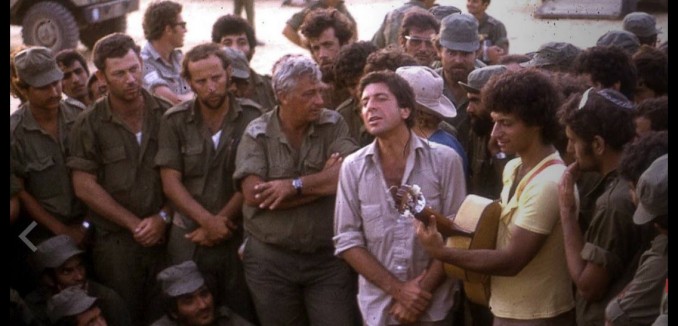Israel’s top leaders offered tributes to the legendary Canadian singer Leonard Cohen, who passed away Thursday at the age of 82.
Israeli President Reuven Rivlin shared on Facebook how Cohen’s music affected him and his wife Nechama. “This morning we looked at each other and thought the same thoughts: ‘Dance Me to the End of Love’ was the soundtrack to so many moments in our life as a couple and as a family,” he wrote. “It added, like so many of his songs, a spirit and depth of emotion into our everyday lives.”
Nechama and I mourn the passing of #LeonardCohen. So many of his songs added a spirit and depth of emotion into our everyday lives.
— Reuven Rivlin (@PresidentRuvi) November 11, 2016
“How sad to part from this man whose voice and face accompanied us for so many years,” he added. “A giant of a creator, open to all people, who also knew how to accompany the State of Israel in the fields of battle and in times of growth.”
Rivlin was referring to Cohen’s 1973 visit to Israel, during the Yom Kippur War. As The New Yorker recounted in a recent profile, “Cohen showed up in Israel, hoping to replace someone who had been drafted. ‘I am committed to the survival of the Jewish people,’ he told an interviewer at the time. He ended up performing, often many times a day, for the troops on the front.”
In a 2013 article in Yisrael Hayom, Neta Bar-Yosef recounted Cohen’s tour:
The fact that there were no decent conditions to hold a show in — certainly not the kind Cohen was used to — did not bother him. He went up on stage with a classical guitar and no amplification but a single microphone that a soldier volunteered to hold for him.
While quite a few of the soldiers didn’t know who Cohen was, others identified his songs and his voice, and were very touched that Cohen had come to Israel to be with them during those difficult times. For those who knew Cohen, his show was an extraordinary event. After all, it was not every day that they got to be present at a private, intimate performance just for them. It was a musical escape from hell. During one show, before Cohen sang “So Long, Marianne,” he told the soldiers: This song should be listened to at home, with a drink in one hand and your other arm around a woman you love. I hope you’ll have that soon.
Everyone who met Cohen and spoke with him during his stay in Israel describes him as modest and gentle man who wanted to connect to and feel the audience he sang for. “On some of the bases we went to, I tried to get him preferential treatment, a room to sleep in, decent food instead of army rations. But he wouldn’t allow it,” [singer and friend Oshik] Levi says with a smile. “The three of us slept in sleeping bags in the canteen or anywhere else we could sleep. He never complained about anything, not even once.”
On this day, we salute a dear friend of the IDF, #LeonardCohen. Yom Kippur War, Israel. 1973. pic.twitter.com/Iz3qNsRV6k
— IDF (@IDFSpokesperson) November 11, 2016
(Future Israeli Prime Minister Ariel Sharon is standing to Cohen’s right in the above photo).
Israeli Prime Minister Benjamin Netanyahu, who served in the 1973 war, also recalled Cohen’s performances. “I will never forget how he came during the Yom Kippur War to sing for our soldiers because he felt he was a partner,” Netanyahu tweeted. The prime minister described Cohen as “a talented artist and warm[hearted] Jew who loved the people of Israel and the state of Israel.”
לאונרד כהן היה יוצר ענק, אמן מוכשר ויהודי חם שאהב את עם ישראל ומדינת ישראל. לא אשכח איך הגיע במלחמת יו״כ כדי לשיר לחיילים מתוך תחושת שותפות
— Benjamin Netanyahu (@netanyahu) November 11, 2016
Cohen, who was described by The New York Times as one of the “foremost songwriters of the contemporary era,” frequently wrote songs that touched on his Jewish faith. He is best known for his song “Hallelujah.” The song, which was originally rejected by his record company in 1984 for having insufficient commercial appeal, didn’t gain an audience until recorded by Jeff Buckley a decade later. Since then the song has been recorded by over 200 artists, including Bob Dylan and Justin Timberlake.
Cohen was inducted into the Rock and Roll Hall of Fame in 2008 and received a Lifetime Achievement award from the National Academy of Recording Arts and Sciences, the organization that runs the Grammys, in 2010.
At the end of his final concert in Israel, in 2009, Cohen recited the Jewish priestly blessing:
[Photo: Kobi Doron ]




